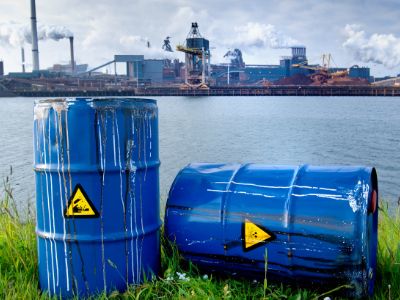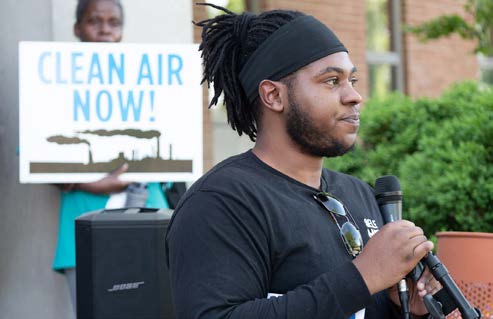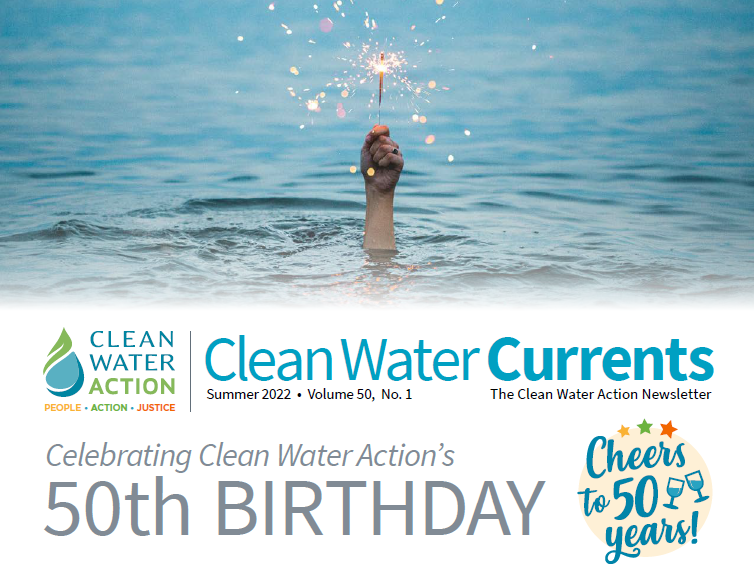In This Issue
- Celebrating Clean Water Action's 50th Birthday
- Protect Our Water from Chemical Spills
- Making Environmental Justice a Policy Priority
- Protecting All of Our Water
- Taking on “Forever” PFAS Chemicals
- We All Live Downstream: Clean Water Podcast
- More National Campaigns News
- State and Regional News
Download the PDF of this newsletter
 Cheers to 50 Years! Celebrating Clean Water Action’s 50th Birthday.
Cheers to 50 Years! Celebrating Clean Water Action’s 50th Birthday.
50 years ago, Clean Water Action’s founder David Zwick helped write and pass the Clean Water Act which recognizes that access to clean, safe water is a critical human right. That same year, Clean Water Action was founded!
2022 marks a monumental year in which we can celebrate the power and promise of the Clean Water Act to protect communities around the country and demand equal justice and access to clean water. We still have a long way to go to ensure all of the waters of the U.S. are protected and achieve our goal of swimmable, fishable, and drinkable water for every community in America. Join us!
Support: Make a gift today to power our campaigns now and for the next 50 years. Your support is essential to helping Clean Water Action protect our water and health, tackle the climate crisis, and make our democracy work. Donate here: www.cleanwater.org/donate
Tell Your Clean Water Story: In honor of Clean Water Action's 50th birthday, we’re sharing our history and journey with the people who have joined us along the way as we worked to protect clean water through #CleanWater50Stories. Submit your story here: www.cleanwater.org/50-stories
Events, Stories & Updates: Find out about 50th celebration events in your area and the latest stories and updates here: www.cleanwateraction.org/celebrating-50-years-clean-water-action
 Protect Our Water from Chemical Spills
Protect Our Water from Chemical Spills

Facilities that store hazardous substances near water bodies, including drinking water sources, need to plan ahead to prevent spills that can occur during extreme weather events like hurricanes. Prevention plans required in the Clean Water Act for decades have not been put in place. As a result of settlement around litigation with our partners in the Environmental Justice Health Alliance, the Natural Resources Defense Council, and others, the Environmental Protection Agency (EPA) has finally proposed requirements for chemical spill prevention plans and is taking public comments through July 26th. Tell EPA to finalize the strongest “Worst Case Discharge Rule” possible to protect fenceline communities and their water resources by submitting your comments here. Learn more in a blog post by Clean Water Action’s National Water Campaigns Coordinator Sean Jackson.
 Making Environmental Justice a Policy Priority
Making Environmental Justice a Policy Priority
Through executive orders and other actions, the Biden administration has made addressing the disproportionate impact of pollution on people of color, low-income communities, and Tribal and Indigenous communities a policy priority. Clean Water Action is engaging with the administration to make sure that these policies succeed and that concrete progress is made to reverse the patterns of environmental injustice. The Justice-40 Initiative, an all-of-government effort to improve environmental justice outcomes, is of particular interest since three of its 21 pilot projects involve water programs. Clean Water Action’s National Water Projects Coordinator, Thea Louis, reviewed the first year of the Justice-40 initiative in a blog post here.
The U.S. Congress is also moving forward on developing remedies to the cumulative impacts of the disproportionate pollution burden that is placed on some communities. The Environmental Justice for All Act (H.R. 2021), introduced by Rep. Raul Grijalva (D-AZ), is a comprehensive approach to addressing longstanding environmental inequities that harm communities of color, low-income communities, and Tribal and Indigenous communities across the country. Urge U.S. House members to co-sponsor and support this important bill.
 Protecting All of Our Water
Protecting All of Our Water
Making sure that Clean Water Act programs protect critical water bodies remains a priority campaign for Clean Water Action. For over twenty years, powerful polluters have been working to limit the definition of “Waters of the U.S.'' for the Clean Water Act’s pollution programs. At issue are many water bodies, including many streams and wetlands, that influence the water quality in downstream rivers, lakes, and bays - including many of our drinking water sources. Early this year, Clean Water Action mobilized thousands of grassroots comments to EPA and the Army Corps of Engineers urging them to repeal the Trump administration’s “Dirty Water Rule” and to develop a strong and durable replacement definition of “Waters of the U.S.” for purposes of the Clean Water Act. Read Jennifer Peters’ testimony at one of the public listening sessions here. The Supreme Court will soon hear a case on this issue, and Clean Water Action is joining allies to weigh in on this critical decision.
 Taking on “Forever” PFAS Chemicals
Taking on “Forever” PFAS Chemicals

Clean Water Action is making a difference in tackling “forever” PFAS chemicals. PFAS chemicals, which build up in our bodies and in the environment and which are very difficult to destroy, are linked to numerous health effects and are being discovered nationwide, including in drinking water sources. Two key strategies are getting PFAS chemicals out of products and keeping them from getting into water in the first place.
Clean Water is pushing members of the U.S. House of Representatives and U.S. Senators to support bills that would get PFAS chemicals out of food packaging. Please contact your members of Congress here and learn more about federal momentum on food packaging and Burger King’s PFAS packaging phase-out in Jen Loveland-Rose’s blog post.
Clean Water Action’s National Water Programs Director Jennifer Peters leads the organization’s work to use the Clean Water Act’s programs to keep PFAS chemicals out of our water. Using the Clean Water Act to address PFAS has many benefits, including shifting the burden away from drinking water systems and communities that have to clean-up PFAS and back on to the industries that financially benefit from using these chemicals. In May, EPA announced plans for including these chemicals in the Act’s water pollution discharge permits, a long overdue first step that Jennifer discusses in this blog post. Meanwhile, states don’t have to wait to make progress in curbing PFAS pollution from industrial sources. For example, Michigan and Colorado are leading the country in requiring industries to rein in their toxic discharges of PFAS. Clean Water Action is also working with allies in Colorado to push for strong permit requirements for PFAS discharges from the notorious Suncor oil refinery.
We All Live Downstream - Clean Water Action Podcast
Podcast fan? Grab your headphones and listen to new episodes of Clean Water Action’s podcast We All Live Downstream! Hear from leading environmental and clean water activists about their work on topics from drinking water and climate change to environmental justice, plastic pollution, and toxic chemicals. Listen at cleanwater.org/podcast or wherever you stream your favorite podcasts.
 More National Campaigns News
More National Campaigns News
- In EPA’s March 8 release of an initial policy Memorandum, National Campaigns Director Lynn Thorp applauded “. . . EPA’s leadership to ensure effective and equitable programs to spend the transformational investments made possible by the Bipartisan Infrastructure Investment and Jobs Act.
- National Water Programs Director Jennifer Peters has been serving on the National Drinking Water Advisory Council, which advises EPA on drinking water policy, since March 2021.
- National Campaigns Director Lynn Thorp is co-chairing the Source Water Collaborative, a diverse group or organizations working together since 2006 to elevate the need to protect drinking water sources from pollution that leads to increased public health risk and higher costs for consumers.
- Clean Water Action’s work to secure federal investment in fully replacing lead service lines, which when they are present are the largest source of lead in drinking water, helped win $15 billion in funding in the Bipartisan Infrastructure Investment and Jobs Act. Next steps include making sure this money is spent effectively and equitably and pushing for increased investment to get all of these pipes out of the ground.
- Podcast fan? Grab your headphones and listen to new episodes of Clean Water Action’s podcast We All Live Downstream! Hear from leading environmental and clean water activists about their work on topics from drinking water and climate change to environmental justice, plastic pollution, and toxic chemicals. Listen at cleanwater.org/podcast or wherever you stream your favorite podcasts.
 State and Regional News
State and Regional News
 CALIFORNIA
CALIFORNIA
California June Primary
Primaries were held in California on June 7th for nearly 160 races for state and federal offices. Clean Water Action’s Vote Environment Committee endorsed 10 candidates. Among the determinations when endorsing were the competitiveness of the race and the potential to elect leaders for the environment, social justice, and democracy.
We’re happy to report that six of our endorsed candidates placed in the top two for the primary election and will be on the ballot for the November 8th general election: US Congress candidates Kevin Mullin and David Canepa (CD-15), State Senate candidates Dave Jones (D-8) and Aisha Wahab (SD-10) and State Assembly candidates Sara Aminzadeh (AD-12) and incumbent Rebecca Bauer-Kahan (AD-16). We look forward to continuing to support their candidacies. Read our full endorsement list and find information on redistricting and voting at cleanwater.org/voteCA.
Clean Water in the California Legislature
On the legislative front, Clean Water Action is working on multiple bills; the establishment of a low-income lifeline rate for water (SB 222, Dodd); legislation to limit the drilling of unsustainable new wells (AB 2201, Bennett) and the passage of AB 2247 (Bloom) which would require reporting of PFAS entering the state in products. AB 2247 is a partnership between advocates and wastewater agencies, which are held responsible for chemicals in the wastewater stream even if the source cannot be identified. Send an email in support of AB 2247 and other PFAS bills today!
California’s seemingly endless drought is continuing and communities are in for another tough summer. Last year, over 1,000 wells went dry around the state; that number could be even higher this year. Clean Water continues to work to ensure that emergency assistance is available to those who lose their water supply and to find additional dollars for water conservation efforts.
Watching California’s Water
California’s seemingly endless drought is continuing and communities are in for another tough summer. Last year, over 1,000 wells went dry around the state; that number could be even higher this year. Clean Water continues to work to ensure that emergency assistance is available to those who lose their water supply and to find additional dollars for water conservation efforts.
In June, Clean Water released a report with partner organizations on the Sustainable Groundwater Management Act (SGMA) and Underrepresented Farmers. The report highlights the need to adequately include small farmers and farmers of color in the SGMA planning process. Finally, to help communities better understand water conditions around the state, the Department of Water Resource has created a new website, California Water Watch, that provides a ton of information about water conditions around the state. If you’re a water nerd like Clean Water Action staff, you’ll love it!
 COLORADO
COLORADO

Clean Water Action is working with allies and impacted residents to urge Colorado to rein in Suncor Petroleum Refinery’s horrendous water pollution. Suncor is a 90-year-old refinery in North Denver that sits near the confluence of Sand Creek and the South Platte River, which is a drinking water source for hundreds of thousands of people downstream. The predominantly Latino neighborhoods surrounding the refinery are overburdened by air and water pollution and live in what has been called the most polluted zip code in the country.
While the revised wastewater permit proposed by the Colorado Department of Public Health and the Environmental (CDPHE) includes new limits on PFAS and other dangerous chemicals related to petroleum refining, and stricter limits for arsenic and heavy metals, the proposed permit leaves already disproportionately impacted communities unprotected from dangerous levels of water contamination, especially from PFAS.
Clean Water Action will continue to work with conservation and justice groups to urge the agency to issue a final permit with much stronger PFAS limits. The final permit must also shift the pollution burden away from the communities living near the facility, as well as the communities downstream whose drinking water sources are impacted. It is Suncor, and not the surrounding disproportionately impacted communities, or downstream drinking water systems and their customers, who should bear the cost of cleaning up its toxic water pollution.
Clean Water Action also endorsed groundbreaking PFAS legislation that Governor Polis signed on June 3rd. This new law restricts the sale of PFAS “forever chemicals” in consumer products including oil and gas products; carpets or rugs; cosmetics; fabric treatments; food packaging; juvenile products; textile furnishings; and upholstered furniture.
Colorado is the first state in the U.S. to include a prohibition on PFAS chemicals in fluids that are used in the extraction of oil and gas products. Colorado is also the first state in the country to pass a state law that explicitly bans the entire class of PFAS in cosmetics, textile furnishings and indoor and outdoor furniture.
Jennifer Peters, Clean Water Action’s National Water Programs Director, also serves on the Denver Water's Lead Reduction Program Advisory Committee and is working to ensure EPA renews Denver's program to remove all lead service lines at no cost to its customers.
 CONNECTICUT
CONNECTICUT

Exciting news from Connecticut! Clean Water Action just launched its new Home Energy Action campaign. Working with local partners and community leaders in Waterbury, CT, the campaign helps residents learn about and participate in the Home Energy Solutions program administered by Eversource. This program provides a very low or no cost evaluation of areas in the home that can be more energy efficient, reducing energy use, saving residents money, making homes more comfortable and reducing greenhouse gas emissions.
Why is Clean Water Action involved?
In Connecticut, many low-income residents pay up to 30 percent of their monthly income to heat and cool their homes since many of these homes are old and not sufficiently insulated. Emissions from buildings contribute to about one third of carbon pollution, according to the recent Governor’s Council on Climate Change report. Connecticut law requires that 80 percent of residences must be weatherized by 2030 to meet our Global Warming Solutions targets. Yet, the state is nowhere near reaching that goal, despite having good programs in place.
Many reasons exist for the low rate of participation in the program, including barriers like mold and asbestos that must be addressed before sealing up a leaky home, perceived costs, difficulty navigating the system, landlords that don’t feel like they have an incentive to invest in weatherization, language barriers, and numerous other social and cultural reasons.
Clean Water Action knows the value and benefit of working with local, trusted partners, building community relationships and grassroots organizing. Through employing these skills, the Home Energy Action campaign will help to expand outreach and participation in communities where residents can benefit the most from these services, while also helping reduce carbon emissions.
Clean Water is thrilled to partner with Neighborhood Housing Services of Waterbury, the Mayor’s office, the Police Activity League and many local leaders to do direct engagement with residents and make the sign-up process easy. Don’t miss upcoming events at City Hall, table at the city’s Juneteenth celebration, the upcoming Pride event, and many others which will help the campaign achieve its goal of signing up more than 310 residents by the end of the year. Learn more or sign up here.
 DISTRICT OF COLUMBIA / VIRGINIA
DISTRICT OF COLUMBIA / VIRGINIA

The Anacostia Parks & Community Collaborative Selected for Thrive Outside Washington, DC
In the District of Columbia, Clean Water Fund serves as the fiscal agent of the Anacostia Parks & Community Collaborative (APACC). APACC is a network of community leaders and organizations working together to make the Anacostia River and its park system the best possible resources for residents of Wards 7 and 8. Over 90% of the District’s African-American residents live in Wards 7 and 8, where more than 25% of families live below the poverty line.
The Outdoor Foundation recently announced its third cohort of Thrive Outside Communities in Chicago, Detroit, Seattle, and Washington, DC. The initiative awards multi-year, capacity-building grants to diverse communities, directed at building and strengthening networks that provide children and families with repeat and reinforcing experiences in the outdoors. Thrive is a community-led initiative built with trusted local and national partners and supported by three years of funding.
“The Anacostia Parks Community Collaborative is a prime network of environmental and community-based organizations working to make outdoor experiences meaningful for economically stressed youth and families. We are incredibly happy to build out our Meaningful Park Engagement work through Thrive DC,” said Akiima Price, Thrive Outside D.C. Director. “This opportunity will allow us to expand our capacity to work throughout the Anacostia River corridor, delivering thoughtful outdoor experiences that support the youth development needs of neighboring stressed communities.”
Clean Water Action helps defeat anti-environment bills in Virginia
In 2021, in the face of aggressive anti-environment campaigns, Clean Water Action, along with our members, helped defend environmental leaders in Northern Virginia’s State House Districts 10, 40 and 51. Clean Water could not be prouder of the network of volunteers that made those wins possible.
Although control of the State House of Delegates was lost, and the pro-environment candidate lost the bid for governor, there were a few bright spots. One is that pro-environment representatives still control the Virginia Senate, which provided a check on the House of Delegates during this year’s legislative session – blocking extreme bills. Together with allies, Clean Water Action helped defeat a handful of bad bills which would have rolled back clean water protections and diverted funding away from those who need it most. Overall, 13 out 14 bad land-use and transportation bills were defeated.
Clean Water Action will continue to build on our history of turning out clean water voters and working with the Virginia conservation community to elect pro-environment candidates to Congress in 2022, and advance environmental policies during next year’s Virginia’s legislative session.
 MARYLAND
MARYLAND
Clean Water Action’s Maryland staff worked hard this legislative session on a wide range of bills - with a lot of success! The Governor signed one of the organization’s priority bills into law that was four years in the making – creating a regulatory board for the septic industry in Maryland.
Several Zero Waste priorities made it across the finish line, especially for promoting zero waste in schools – one setting up a grant program to support food waste diversion in school cafeterias and one requiring newly-constructed schools to be designed with sorting and separating trash, recyclables, and compostables in mind.
Clean Water Action worked with the Mid-Atlantic Justice Coalition to advance Justice 40 principles, and secured language mandating that 40 percent of spending in key areas related to environmental justice be dedicated to overburdened and low-income areas of the state.
One of Clean Water’s long-term priorities, however, didn't make it out of the legislature – taking trash incinerators and other polluters out of Maryland’s Renewable Portfolio Standard. And most disappointingly, the outgoing Governor vetoed the Transit Equity Act, a bill designed to proactively enforce Civil Rights Act Title VI protections in Maryland in response to some of the Governor's most egregious decisions. Maryland will have a new legislature and new governor after the election this year - and even new districts. Maryland staff will be working hard to educate these new representatives about our priority issues.
At the local level, Clean Water Action secured a major win this spring in Frederick. The organization has been working for four years to monitor environmental remediation of Area B of Fort Detrick in Frederick and to improve local government planning around the site. Area B is a Superfund site where bioweapons research and radioactive materials were dumped in the 1960s without environmental controls. For over a decade, Frederick City has been planning to build a section of the city's new beltway through the Superfund site threading between those old disposal sites, risking disruption of hazardous materials and altering stormwater and groundwater flow—all of which could increase the movement of contaminants offsite. In the FY23 capital budget, the Frederick city government at last committed to constructing the road on an alternative off-base route instead! It’s common sense, but a major step forward for the City's approach to protecting residents from the potential hazards of Area B.
 MASSACHUSETTS
MASSACHUSETTS
PFAS Task Force Report
Following advocacy and mobilizing, the Massachusetts PFAS Interagency Task Force released their final report to the Legislature this spring about regulating and mitigating the impact of PFAS in Massachusetts. The report is consistent with Clean Water Action’s calls to action! Email your legislator and tell them to get toxic PFAS out of consumer products.
Environmental Justice (EJ) Work in Randolph and Taunton
Clean Water’s canvass team is working to educate and mobilize residents in the EJ communities of Randolph and Taunton, knocking on doors and talking directly to local residents. In Randolph, PFAS contamination of their water supply and poor management of alternative safe drinking water sources has created barriers to access safe drinking water. Clean Water Action is working to spread information about PFAS as well as support efforts to address this crisis. In Taunton, Clean Water is collaborating with the Coalition for Social Justice and Clean Air Taunton to block the siting of Aries’ proposed sludge incinerator in the city. These types of facilities release PFAS from our waste into the air nearby residents breathe.
Air Quality in EJ Communities
With the Massachusetts Environmental Justice Table, Clean Water Action is pushing for bills that address siting of energy facilities in EJ communities and require monitoring for air pollution. The air quality bill passed the Senate in modified format and is one of Clean Water’s main priorities for passage in the House between now and late July when the session ends. Demand clean air for everyone! Take action here to support bill H2230.
Lead Service Line (LSL) Replacement
Clean Water Action has continued its partnership with the City of Malden, an EJ community with the highest number of known LSLs in Massachusetts. Since 2021, Clean Water has helped the city apply for grant funding, wrote a letter of support to Representative Clark and Senator Warren, and organized with a local racial equity group to create a similar push from residents. Malden received about $4 million dollars and has agreed to cover both the public and private side of LSL replacement, making it far more likely that renters and low-income homeowners can now afford full LSL replacement.
 MICHIGAN
MICHIGAN
Shutting Down Line 5
In March, the Michigan Public Service Commission (MPSC) held public hearings to solicit comments on Enbridge Energy’s proposal to build a tunnel through the Straits of Mackinac. The tunnel scheme is Enbridge’s last ditch effort to continue operating the nearly 70 year old Line 5 pipeline that currently moves oil and gas through the heart of the Great Lakes. In a win for the environment the MPSC announced that, for the first time in its history, it would be considering the impacts the tunnel would have on climate change when making its decision on the permit Enbridge is seeking. Clean Water Action appreciates all members who took action and submitted comments to the MPSC. Their decision is expected later this year or early next year.
Protecting Water in the Michigan Legislature
Also in March, Clean Water Action partnered with water champions in the Michigan State House and assisted in the creation and introduction of a package of legislation that would protect Great Lakes water from being commodified and exported outside of the Great Lakes basin. Though widely supported by Clean Water Action members and residents across the state, Republican leadership refuse to grant the bills committee hearings.
In other legislative news, Senate Bill 565 passed both the House and Senate with broad bipartisan support and was signed by Gov. Gretchen Whitmer. This major supplemental budget bill was expanded from the original $3.3 billion to $4.7 billion of investments to clean up and protect the Great Lakes, overhaul outdated storm and waste-water infrastructure, fund septic system programs, and remove lead pipes. The bill also included critical earmarks of $45M for Benton Harbor and $75M for Detroit for lead pipe removal in those two hardest hit communities.
Michigan Democracy and Elections
Though pleased with the outcome of the budget supplemental bill this spring, Michigan residents continue to be threatened by anti-environment and anti-democracy legislators in Lansing. In partnership with the Sierra Club – Michigan Chapter, Clean Water Action released its legislative scorecard in May. Throughout the 2021-2022 legislative session, several bills were introduced that would bolster environmental protections and strengthen Michigan’s ability to respond to the climate crisis. These policy aims are supported by a majority of Michigan voters, however most of these bills failed to receive even a committee hearing. Instead, legislative leaders prioritized bills that would make it harder for Michigan voters to make their voices heard at the ballot box.
Finally, the Michigan midterm elections are underway. Priority races include Gretchen Whitmer for Governor, Dana Nessel for Attorney General, Jocelyn Benson for Secretary of State, and a slate of Congressional, State Senate and State House candidates with strong environmental priorities. Find all of Clean Water Action’s endorsements for Michigan’s August 2nd primary and voting information at cleanwater.org/voteMI.
 MINNESOTA
MINNESOTA
Taking on Toxics in the Legislature
In January, Clean Water Action concluded a series of PFAS Summit meetings that successfully brought a number of stakeholders – agencies, impacted communities, NGOs, local governments and legislators – together to talk about joint priorities for addressing PFAS. As a result, the PFAS Prevention Package was created – a series of 8 bills designed to prevent future PFAS pollution. Efforts now focus on figuring out how to clean up what was already there.
Clean Water worked with its partners to introduce multiple bills at the state legislature for full lead service line removal in Minnesota, removing lead from schools and daycare facilities, and reducing the use of lead in ammunition and fishing tackle. The most significant bill, HF4115 will provide $30M per year for 10 years from the General Fund to cover all the costs of full LSL replacement statewide. It will also prioritize environmental justice and low income communities. Unfortunately, the legislature failed to pass the bill.
Although the Legislative Session ended without these bills making it to the finish line, 7 PFAS bills and a strong lead agenda moved during the Session. This helped the organization to raise the visibility of these issues, develop new allies and champions, and set the table for future progress. Clean Water Action will be working hard in the coming months to hold legislators, especially Senate Leadership, accountable for the lack of progress on environmental protections.
Clean Water Action also took our message beyond Minnesota with a successful virtual “Great Lakes Week” to advocate for the health of 21% of the world’s fresh accessible surface water.
Environmental Justice and Healthier Communities
Clean Water Action has been supporting the work happening in North Minneapolis to shut down the trash incinerator located right in the middle of a very low income and BIPOC neighborhood. This has been combined with efforts to push the county to adopt a zero waste plan that will actually be implemented, and which centers community needs and environmental stewardship.
Supporting Sustainable Agriculture
In May, an online Field to Fork Forum was hosted in collaboration with sustainability partners Land Stewardship Project to discuss the action to urge the U.S. Department of Agriculture (USDA) to improve their pollution prevention. Thanks to almost 200 Clean Water Action members for speaking out and urging the USDA to fix factory farms and prioritize clean water and racial equity in their allocations, actions, and policies.
Field to Fork is also reaching out to Minnesota groceries to carry sustainable options on their shelves, with a focus on healthy and humanely raised meat products, sourced from producers working to protect the environment, and clear and transparent labeling. Sign your name to our petition so that all Minnesotans are able to make informed purchasing decisions for ourselves, our families, and our environment. Planning to enjoy the good weather with good friends and good food? Check out our sustainable shopping tips and make your BBQ as “green” as possible this summer!
 NEW JERSEY
NEW JERSEY
Clean Water Action continues to hit milestones on environmental justice as it celebrates its 40th year in New Jersey and 50th year since its founding. As one of the driving forces behind the state’s historic environmental justice (EJ) cumulative impact law, Clean Water Action expects full adoption of the corresponding regulations by year end 2022.
In the meantime, Clean Water is involved in many community-led fights that stopped or paused permits for polluting power plants, pipelines, etc. This is part of a statewide campaign, EmpowerNJ, to achieve 50% reduction in greenhouse gases by 2030 and 100% renewable energy by 2050 (as stated in the Governor’s EO274) while creating sustainable green jobs and for all.
On a civil rights front, Clean Water Action has been working closely with others to advance a voter-approved Green Amendment that would ensure clean air, water, and environment as a constitutional right in the Garden State. Clean Water Action is just one co-sponsor short of a majority in both the NJ Assembly and Senate.
In January, the Governor signed the Recycled Content bill (S2515) into law. It establishes one of the strongest policies in the nation for post-consumer content in packaging and containers. This was accomplished as NJ was gearing up to implement the state’s plastic bag and polyfoam ban (effective May 4th ). The plastics industry was pushing to change the definition of a “reusable bag” to allow for more traditional single use plastic bags along with a food pantry exemption. Clean Water Action fought back and won – granting only a 6-month extension and distribution of 500,000 reusable bags for the food pantries. The organization is now working with them to develop bag recirculation strategies.
The New Jersey team is growing! A warm and enthusiastic welcome to Terrance Bankston, Clean Water Action’s New Jersey Environmental Justice Organizer, who will be leading base-building efforts in EJ communities.
Clean Water supporters and members are invited to join Clean Water Action to celebrate victories and plans for the future at NJ’s annual fundraising event “Autumn Toast to a Healthy Environment: Cheers to 50 years!” on Saturday, October 1, 2022 at Weequahic Park Community Center, Newark. The goal is to have fun and raise $50K for Clean Water’s 50th anniversary. RSVP www.CleanWater.org/AutumnToast.
 PENNYSLVANIA
PENNYSLVANIA

New drinking water standard for PFAS moves forward
Pennsylvania has been working to establish a state drinking water standard for toxic PFAS chemicals, which have been found throughout the state and have led to numerous public and private water supplies being shut down due to contamination. This would be the first time Pennsylvania has set its own drinking water standard separate from the federal Safe Drinking Water Act standards. Clean Water Action has been working in a coalition with other statewide environmental groups and community-based groups that have been established in response to PFAS contamination in southeast PA. During a recent public comment period on the proposal, Clean Water Action played a major role, gathering about half of the over 4,000 comments submitted.
Primary Election Brings Victories for Clean Water Candidates
The May 2022 Democratic Primary in Pennsylvania brought many attacks against strong clean water legislators that Clean Water Action helped get elected in recent years. None were more targeted than State Rep. Summer Lee, who has represented the Mon Valley area of Allegheny County and decided to run for the open Pittsburgh area U.S. House seat. Clean Water Action has supported Rep. Lee since her first run for State House in 2018, and she openly campaigned on environmental justice issues. Thanks to 3,000 Clean Water members in the district who helped get Summer Lee over the top in a narrow victory of only 800 votes out of over 110,000 cast. Summer will be the first Black woman in the PA Congressional delegation when she likely wins in the general election this fall.
In addition to Rep. Lee’s victory, Clean Water Action endorsed a number of State House incumbents who have been environmental champions and were being challenged in the recent primary. Rep. Kinkead (Allegheny), Rep. Benham (Allegheny), Rep. Rabb (Philadelphia), and Rep. Krajewski (Philadelphia) were all successful in winning their races!
Green Space for Black and Brown Neighborhoods in Philadelphia
In Philadelphia, Clean Water Action helped launch the Resilient Community Stormwater Initiative that is engaging with eight different low-income neighborhoods of color around the creation of green space and green stormwater infrastructure to address flooding and sewage overflow issues. Clean Water is playing a key role in connecting technical work with local community partners to give residents a strong role in identifying goals and project needs in the neighborhoods.
 RHODE ISLAND
RHODE ISLAND
Rhode Island Welcomes New State Director, Jed Thorp!
Clean Water Action is very excited to introduce its new Rhode Island State Director, Jed Thorp! Jed is returning to Clean Water Action after, most recently, working as the Advocacy Coordinator for Save the Bay. He has a long career as an organizer and is very familiar with Clean Water Action and its local campaigns, so he is ready to hit the ground running.
The beating heart of Clean Water Action is its thousands of grassroots members and the canvassers who meet and speak with supporters in neighborhoods every evening. Jed gets canvassing and organizing. He started his professional advocacy career as a canvasser with Ohio Citizen Action, and he has been bringing people together for positive change ever since.
For the past two decades, Jed has worked as an advocate with environmental organizations including Clean Water Action, Sierra Club, and Save the Bay. He also spent five years as the Public Information Officer for the Ohio EPA. Additionally, Jed served as the Membership Director for RI Public Radio and has been on the board of Common Cause RI since 2015.
Bills to Protect Rhode Islanders from Toxic PFAS Hang in the Balance
Per- and polyfluoroalkyl substances, or PFAS, are a class of human-made chemicals that are highly toxic and incredibly persistent in the environment. PFAS has been linked to cancers, reproductive harms, suppression of the immune system, and other health problems. Unfortunately, these chemicals are found in many common household products including some food packaging.
The Rhode Island General Assembly is considering two bills to tackle PFAS pollution right now. One, H7233, would set a maximum contaminant level for PFAS in drinking water. The other, S2044, would ban the use of PFAS in packaging, including food packaging, to help address the “upstream” sources of PFAS pollution. Each bill has been passed in one branch of the Assembly, so Clean Water Action is working to ensure that they both get over the finish line before the current legislative session ends. Want to help? Contact your elected officials here.
 TEXAS
TEXAS
Welcome to our new Texas State Director, Becky Smith!
Clean Water Action is happy to introduce its new Texas State Director, Becky Smith! Becky is taking the helm in the Lone Star State after long-time Texas State Director David Foster transitioned into his well-earned retirement at the end of 2021 after 26 years serving the people and natural environment of Texas.
While new to the role of Texas State Director, Becky is no stranger to Clean Water Action. She began her career in 2001 as a Field Organizer in Houston and as Program Assistant learned the ropes of grassroots lobbying in Austin and Washington DC. After 12 successful years as Massachusetts Campaigns Director, Becky completed a Masters of Environmental Management from Duke University. She returned to Texas in 2018 to work with environmental organizations in the Houston area. Clean Water Action is excited to be welcoming Becky back to its Texas office and look forward to what comes next!
Stormwater and Sunset
In Austin, a city council resolution supported by Clean Water Action to require green stormwater infrastructure in code for new and remodeled building projects passed and will move through the implementation phases. Thank you to our Austin members who took action!
At the Texas Capitol, the Sunset Commission hearing regarding recommendations for the Texas Commission on Environmental Quality (TCEQ) took place on June 22nd. The hearing lasted over nine hours with more than 100 individuals delivering testimony. The agency’s chairman was unfamiliar with the term " environmental racism" and many witnesses subsequently provided definitions and examples previously permitted by the agency he chairs. State Director Becky Smith spoke on behalf of Clean Water Action and our Texas members. Her testimony included a list of recommendations including: establishing a well-funded environmental justice office, that the TCEQ take into account cumulative impacts on communities of color when making permit decisions, taking climate science into account when regulating resources and pollution to protect human health and environmental quality, strict nutrient limits in new wastewater discharge permits, and assessing that fines for pollution permit violations that are high enough to act as a deterrent.
Getting Out the Clean Water Vote
In Texas, Clean Water Action’s endorsed primary candidates made it through their primary run-offs on May 24 to advance to November primaries. These include: Jay Kleburg for Land Commissioner, Venton Jones in the Dallas area for Texas House District 100, and John Bryant for Texas House District 114. Two endorsed candidates for board of the Pedernales Electric Co-op, largest electric co-op in the U.S., failed to capture enough votes to oust their incumbents.
Looking ahead to the Fall 2022 general election, Clean Water Action will be helping to elect endorsed environmental advocates. Priorities for US Congress include electing long-time ally Greg Casar to the Austin area 35th Congressional District and protecting Dallas/Fort Worth area incumbent Colin Allred in the 32nd district.
Several state and local races will also be a priority in 2022 including: a heated challenge to incumbent Governor Greg Abbot by former US Rep Beto O’Rourke, a well-funded attack on incumbent Harris County Judge Lina Hidalgo, and the general election for long-time land and parks conservation hero Jay Kleberg for Texas Land Commissioner (a position currently held by George P. Bush). Additionally, we will consider candidates for endorsement based on environmental voting records and platforms in Austin City Council races.
